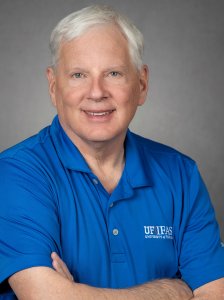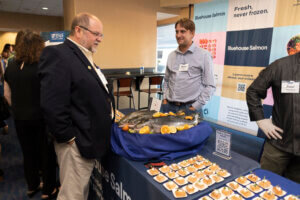May 2023 FloridAgriculture eNewsletter
 By J. Scott Angle
By J. Scott Angle
[email protected]
@IFAS_VP
In a state where Farm Bureau members are so good at producing just about any kind of food, it’s bewildering that we import upwards of 80 percent of our seafood.
I believe we’re at a moment where we have the potential to change that. The latest USDA Dietary Guidelines for Americans basically call on us to double our seafood consumption. How are we going to meet the demand if Americans actually act on this advice? The shutdown of wild harvesting of oysters in Apalachicola Bay makes this an even heavier lift.
Leslie Sturmer of UF/IFAS Extension and the UF/IFAS Nature Coast Biological Station, who has a history of helping turn fishers into farmers, believes we can still be a great oyster-producing state, and we can do it through oyster farming.
Three years ago the UF/IFAS research office set up a starter fund to incentivize investigation into what it calls emerging enterprises, and Sturmer’s oyster work was one of the first projects it funded.
Sturmer built on that early funding and is currently seeking ways to reduce oyster mortality by working with oyster farmers in the Pensacola Bay, Indian River Lagoon, Alligator Harbor, Oyster Bay, and Mosquito Lagoon as well as Apalachicola Bay.
More recently, we launched another starter fund aimed at developing applications of artificial intelligence to help farmers, and again seafood made the list. Aquaculture scientist Huiping Yang has teamed up with two of our recent faculty hires with expertise in AI in hopes of accelerating the breeding of new improved hard clam varieties.
That kind of partnering of scientists is essential to finding solutions to complex challenges.
So is partnering with stakeholders. That’s why Sturmer serves as technical adviser to the Florida Farm Bureau Federation’s Aquaculture Advisory Committee.
Matt DiMaggio, the new director of the UF/IFAS Tropical Aquaculture Lab in Ruskin, does as well. DiMaggio has big plans to expand the Lab’s traditional portfolio focused on ornamental fish to include food fish. I like his plan and intend to support the additional scientists needed as I can find the resources to do so.
Aquaculture doesn’t always have to mean shooting for the center of the plate. We have scientists investigating how to grow coral as a way to restore ecosystems. We’ve looked at baitfish. We even have a biogeochemist working on the prospects for harvesting seaweed.
She sees potential for seaweed as an ingredient in cattle feed that would reduce the animals’ methane emissions.
But we have to do more than see whether it can be done. We need to know if can be done profitably. That’s why we economists Bachir Kassas, John Lai, and Andrew Ropicki of the Food and Resource Economics Department exploring whether consumers would pay more for milk and beef with a smaller carbon footprint, the kind you might get from seaweed-fed cows.
Among our existing fin fish aquaculture research is the work of Cortney Ohs at our Indian River Research and Education Center on how to raise hogfish in tanks as potential food fish. We also recently promoted Leonardo Ibarra-Castro at the UF Whitney Lab in St. Augustine to work on red snapper, snook and red drum.
Ropicki again is also our connection to an exciting company growing delicious, and environmentally friendly Atlantic salmon right here in Florida. As we continue to build on our expertise in fin fish as food, we’ve turned to Atlantic Sapphire.

I can attest to the quality of the product. One of the notable foods at our recent Flavors of Florida showcase of locally produced products was Atlantic Sapphire’s Bluehouse Salmon grown in Homestead.
Company leaders have also come to campus to give a seminar on their experience on the frontier of fin fish farming in Florida. Florida Sea Grant and Ropicki are currently helping to arrange internships at the company. To grow fish in Florida, we’ll have to grow the talent to do it.
J. Scott Angle is the University of Florida’s Senior Vice President for Agriculture and Natural Resources and leader of the UF Institute of Food and Agricultural Sciences (UF/IFAS).
